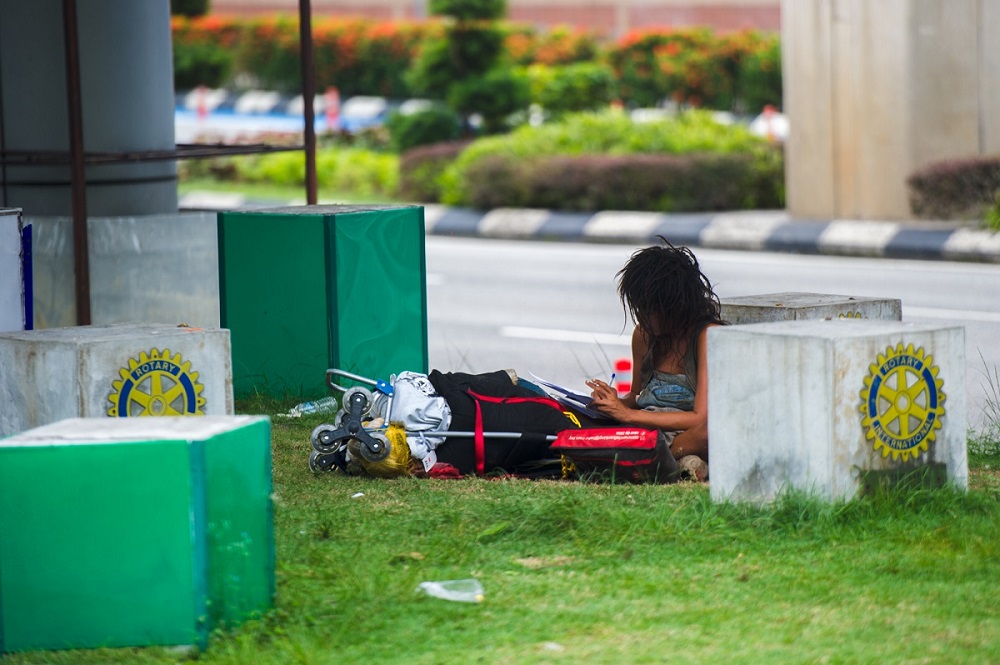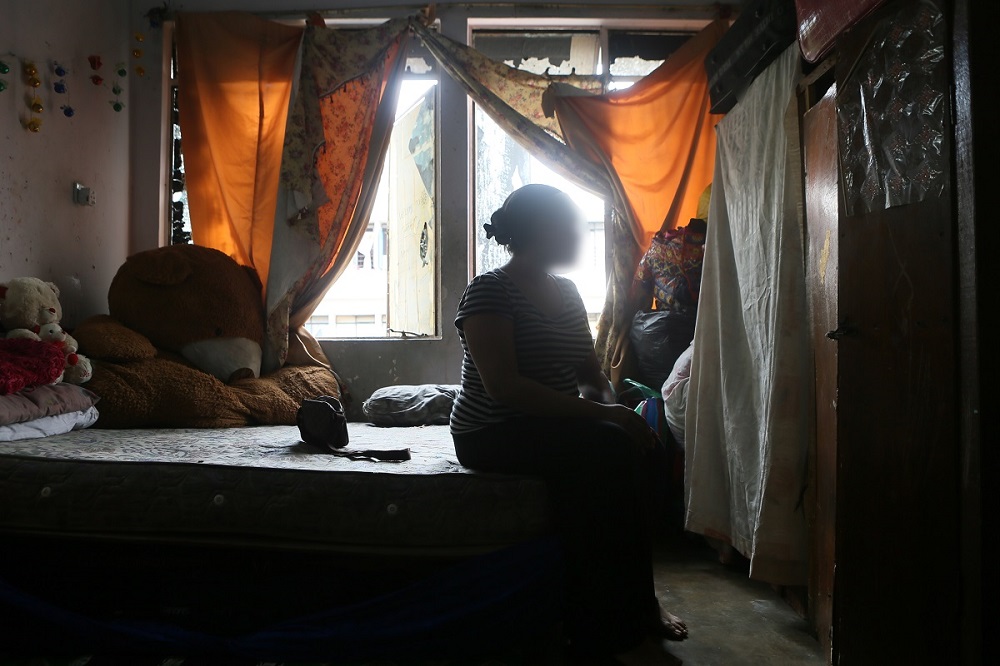KUALA LUMPUR, July 13 ― Tucked in the heart of KL lies an area that conjures up images of negative stereotypes everytime it is mentioned.
Gansterism, drugs and sex work are often connected to Chow Kit despite the many small traders, hawkers and heritage shops operating there.
It has also become a hotspot for the urban poor over the past three decades.
While it is surrounded by multi-billion Ringgit development including the KLCC Twin Towers and the World Trade Centre Kuala Lumpur, life in Chow Kit has not seemed to have benefited from modernisation.
It underwent a face-lift a few years ago in an attempt to spruce up the area for tourists, but the pandemic and prolonged lockdowns seem to have reversed the hard work meant to help Chow Kit.
To take a closer look at the economic implications of the pandemic on the livelihood of the urban poor, Malay Mail took a trip to Chow Kit to speak to some of the people who call Chow Kit their home.

Sex workers
One label that Chow Kit has earned over the decades is being a “red-light district”.
Sex workers often wait for clients in the area while others are either at hidden brothels or offer home-based services to their regulars.
For most, their services start from as low as RM20 just to make ends meet.
Fire (not her real name) is one of the many sex workers in Chow Kit whose livelihood has been severely affected due to the Covid-19 pandemic.
Living in a run-down dormitory-like building less than a kilometre away from the World Trade Centre in Kuala Lumpur, Fire struggles to pay her RM240 monthly rental for a bare room that she shares with another person.

The 34-year-old Kajang-born has spent half of her life in Chow Kit and has yet to see any changes or improvement in her living conditions.
She moved to the area in search of a better life (she had been left at a shelter home when she was a baby and was subsequently adopted).
With no money in hand and no place to stay, Fire was only left with one option – to do sex work.
“I didn’t have any money to eat and when I asked my friends to lend me money, nobody wanted to help.
“So, I had no choice.”

Life became even more difficult for Fire after she got into an abusive relationship for three years.
“My boyfriend used to hit me, splash hot water on me and even once threatened to throw me down from a building.
“He used to take money from me and abuse me.”
Fire said she managed to break free from the abusive boyfriend when she was caught by the police for doing sex work.
She has been in and out of jail 16 times for offences including drugs and sex work.
In 2019, she was caught again and sent to jail for a past drug-related offence.
She served 14 months.
Fire was released in May 2020, but the country was already under the first movement control order, which made it difficult for her to find a job.
“I actually managed to find a few jobs but because I’m from Chow Kit and have been in jail before, they were scared to hire me.
“I hope they will give us a chance as well.”

Despite living in Chow Kit for 17 years, Fire said she doesn’t own anything apart from a torn mattress, an old radio, a pillow and a soft toy.
She spends most of her days searching for a job and she does sex work to survive.
“Sometimes at most I can get between RM20 and RM30 in a day and some days totally nothing.
“My hope is to go somewhere and find better work when the pandemic is over.
“If possible I want to get close to my family and prove that I can be successful in life by changing,” she said.
Fire, however, isn’t the only one going through the extreme effects of the lockdowns.

Pahang-born Syasha (not her real name) left her job as a cashier in a supermarket back in her hometown two years ago hoping to find a better-paying job in KL.
After a brief stint as a beauty shop promoter in KL, the pandemic forced Syasha out of a job.
“I now have to do sex work to earn a living and also support my family back home.
“When I had a full-time job I used to send RM500 to my parents but now because of not having a fixed income I can only afford to send them about RM200.”

Living in a small run-down dormitory-like building in KL with poor hygiene conditions, Syasha said she has to pay RM900 monthly for a small room in a sharing unit with three other people.
Syasha said her living conditions were quite bad and she was often subject to discrimination and abuse.
“People throw eggs and curse me.
“I thought sex work wasn't so bad.
“Now I realise how bad it is to work as a sex worker.”
Syasha hopes to find a permanent job as a promoter once the pandemic was over so that she can find a better place to live.

The homeless and needy
Although the number of homeless in KL has reduced significantly due to various shelter homes operated by the government, it is still quite common to run into needy and homeless people when walking around Chow Kit.
If you take a stroll around the district between 5.30pm and 6.30pm, you will notice long lines of the needy receiving a free meal from various non-governmental organisations (NGO) such as Pertubuhan Kesihatan Dan Kebajikan Umum Malaysia (PPKUM) and Kechara Soup Kitchen (Kechara).
PKKUM has been distributing free breakfast, lunch and dinner to 120 people since the first MCO came into effect in March 2020.

Its president Elisha Kor Krishnan said she has noticed an increase in demand lately.
According to her, there are often more than 120 people queuing up but due to the NGO’s low budget, they find it hard to scale up their project to accommodate more people.
“Apart from food, we have also set up a Covid-19 vaccine registration counter outside our office to help the homeless, sex workers and migrant workers sign up for their jabs.
“Most of them don’t own a smartphone and have difficulties accessing the Mysejahtera application to get their appointments.”

Similarly, over in Kechara, the team has seen more people asking for free meals as the prolonged lockdowns continue to affect people's livelihood.
Its operations director Justine Cheah said apart from the homeless, they also get people who can’t afford to pay for a meal due to loss of income.
Sharing his views on Chow Kit, Cheah said the first impression people often have about the district was a negative one.
“The name Chow Kit is not something usually pleasant but no doubt there was a facelift in that area.
“However, there is still a considerable amount of homeless people living around Chow Kit.”
Cheah also said the homeless around the area were harmless and just lived on the street.
“They usually know the feeding time and spots where free meals are distributed.”
Cheah, however, noted that there were currently several shelter homes operated by the government around KL to house the homeless.
According to him, the number of homeless in KL has reduced significantly due to the shelter homes, especially during the Covid-19 pandemic.
But, he said some of the homeless still preferred to live on the street as going into shelter homes made them feel like they have lost their freedom.

Surviving on free meals
A Kelantan-born man, who only prefers to be known as Zubair, has been calling the pedestrian flyover along Jalan Sultan Ismail in KL home since he lost his job as a cook in a restaurant a few months ago into the pandemic.
The 40-year-old said he was staying with his friends when he had his job but now he has nowhere to live.
“Sometimes people give me food and sometimes I get a free meal from NGOs but I can’t count on it.”
To make a living, Zubair digs into the garbage bins to collect tin cans and sell them.
As the pandemic forces more people out of jobs, senior citizen Chee finds it even more difficult to find a job in the current economic environment.
The 65-year-old said he has already been jobless for five years and only lives on the RM500 he receives through a government scheme.
“I have rented a room nearby for RM300 monthly.
“The remaining RM200 is for me to buy food, which is not enough.”
Chee is a regular at PKKUM and other NGOs distributing free meals daily.
“I used to be in construction and worked with lorries.
“But now nobody wants to hire me because I am old and can’t carry heavy stuff.”

Decades of hardship
Although the pandemic may have brought a new set of challenges in life; generational poverty and multi-layered social issues are not a new problem in Chow Kit.
HIV advocate and PT Foundation chairman Hisham Hussein recalled that such issues in Chow Kit date back to around three decades ago.
Hisham has been at the forefront of HIV prevention, especially among the drug users and sex workers in Chow Kit for over 20 years.
However, he believes the living condition in Chow Kit today is better than what it used to be 20 years ago.
Recalling the early days when he began his advocacy work, Hisham said there was a strong negative perception towards Chow Kit.
“People used to always link Chow Kit to gangsterism, sex work and drugs.
“They were scared to come to Chow Kit, and even today there are some who are still scared to come.”
But according to him, Chow Kit today is better than what it used to be.
“It is a business centre for a different group of people.
“We are not talking about high society here.
“If you want to compare it with the Pavilion, this is the other end of the spectrum,” said Hisham, referring to the upscale shopping complex Pavilion KL situated within proximity to Chow Kit.

Hisham said some of the shops and traders were still in Chow Kit today but the hustle and bustle was less compared to 20 years ago.
Moving forward, Hisham said there was no need to build skyscrapers in Chow Kit and make it like its neighbouring districts.
Instead, he said the government should spruce up the place and help make it more popular.
“Turn it into a more touristic district. It has got a whole lot of history, but why are we not doing anything about it.
“Yes, there were bad times, [but] look at it today. We have improved.”
Malay Mail reached out to Titiwangsa MP and Women, Family and Community Development Minister Datuk Seri Rina Mohd Harun to find what plans were in the pipeline to improve the livelihood of the Chow Kit community affected due to the pandemic but has yet to receive a response.
Chow Kit falls under Rina's constituency.
Looking back to many years of hardship in Chow Kit, Hisham said he still felt sad for those people who died there.
“I suppose nobody wants to talk about those people who died on the street in the back lanes.
“People forget they are human.”






















